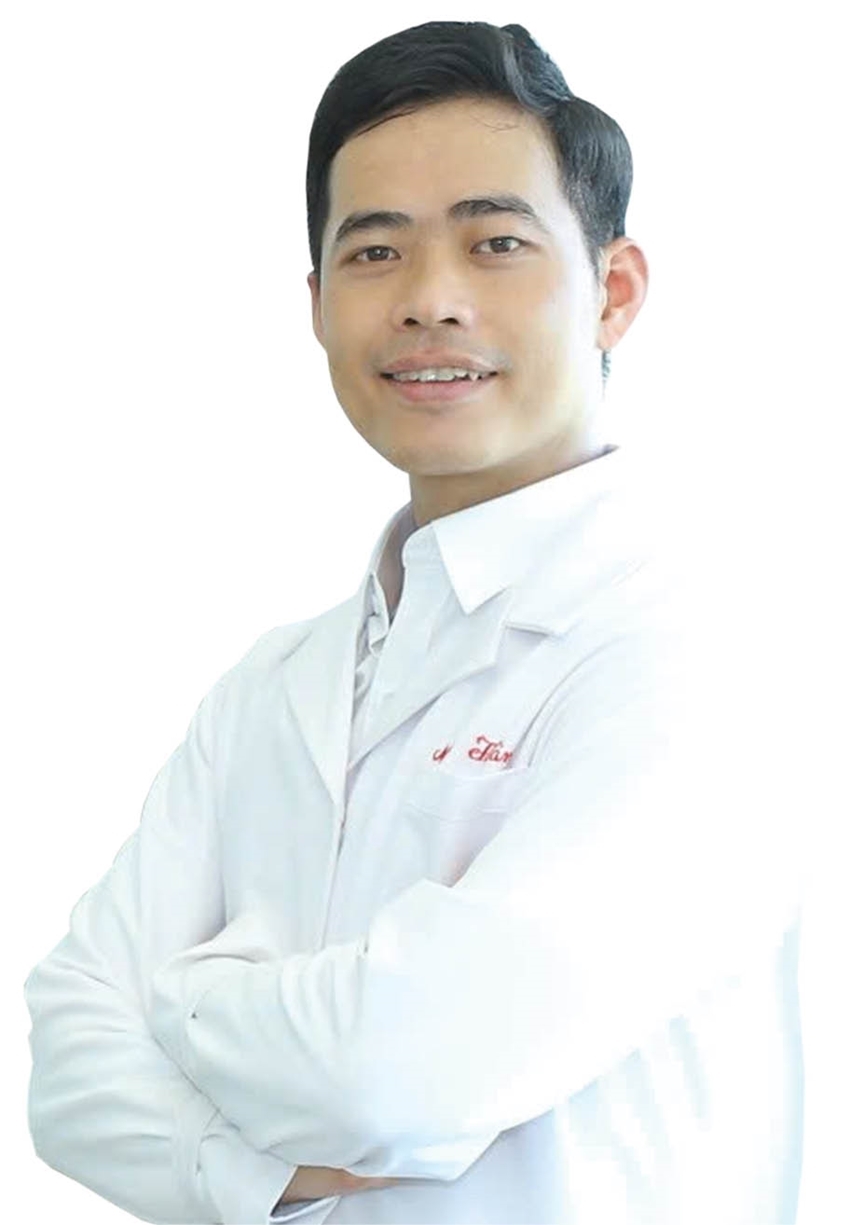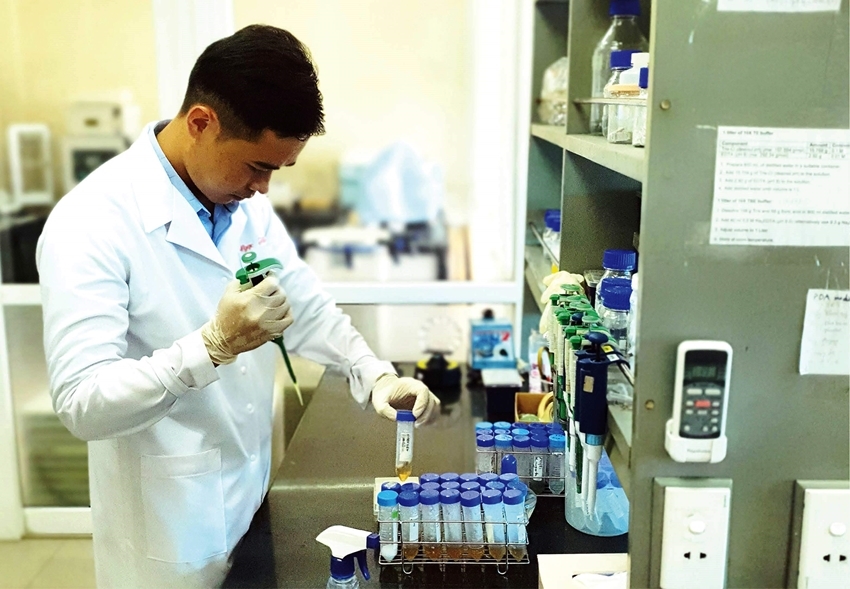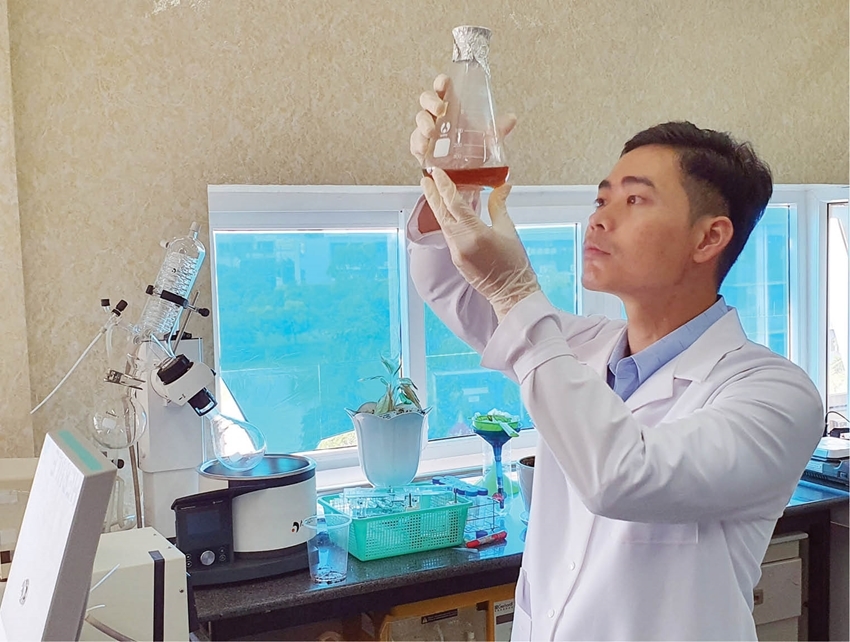 |
| Dr. Ho Ngoc Han |
After his nearly two years of research at Hue University's Institute of Biotechnology yielded initial findings, Thua Thien Hue Weekly sat down with Dr. Ho Ngoc Han for an interview.
As someone who became a public figure after the Road to Olympia competition in 2009, can you share about your journey of studying, researching, and working abroad after winning the competition?
One year after participating in the Road to Olympia competition in 2009, I started my bachelor's studies at Swinburne University in Australia. There, I then went on to pursue a master’s degree and later a PhD in human gene editing. The studying process was on and on; and by the age of 27 – in 2018 – I successfully defended my PhD thesis.
In 2019, after nine years in Australia, I decided to move to England to work in a new environment. I worked at the Francis Crick Institute, a leading microbiology research institute in London. There, I continued researching DNA modification mechanisms, the field in which I had completed my PhD in Australia. I had the opportunity to work with top scientists in the world, which helped me progress quickly and achieve my own results in scientific research.
 |
| Dr. Ho Ngoc Han working in the laboratory |
A standout achievement was my research into DNA repair mechanisms in humans. I discovered that many individuals experience early DNA alterations. Those with altered DNA develop cancer early, from around the ages of 20-25, and usually don’t live past 30. Through research, I discovered a method to help damaged DNA regain its genetic structure. This method is called the "Homologous recombination mechanism to repair DNA breaks in the human body". This mechanism aids in developing antibiotics that effectively combat cancer cells.
After three years working in England, having gained enough experience and knowledge, I decided to return to Huế in 2022. I am currently working and conducting research at the Institute of Biotechnology, Hue University.
We understand that with your abilities, you could have pursued opportunities with higher potential for growth and income. What motivated you to return to Hue?
When I decided to return to Vietnam, my professor in England encouraged me to stay there. After returning to Vietnam, I received numerous job offers from companies with very high salaries – up to 10 times what I earn now. However, I declined all of them and remained firmly in my decision to return home.
Primarily, I returned to Hue because of my family. As the only one left in the country, with my older sister living abroad and my parents aging, I felt a strong need to be there to care for them in the future.
 |
| Dr. Ho Ngoc Han conducting experiments in the laboratory |
Along with the above reasons and with my smoldering desire from the beginning, which is to return to Vietnam and contribute to my homeland, I have made my decision. Although I had many favorable conditions abroad, I always felt that none of the places I lived were truly “home.” Huế, where I was born and raised, is still where I feel a true sense of “home.” With the knowledge and experience I’ve gained, I feel I’m ready to contribute and serve my homeland. These two factors combined led me to make a swift decision to return to Hue.
After traveling to many places, when I returned, I realized that Huế is very different from other places. Life here is gentle, and the living environment is spacious. After work, I can go to the beach or relax by the Hương River, and in the evening, I can go jogging. The material demands here are also less stressful than in other places. The healthcare and education sectors in Huế are also given significant attention, which were important factors for me when choosing a place to settle down.
Returning home to work and accepting various jobs outside of scientific research, how do you deal with public opinion?
As people say "When in Rome, do as the Romans do", then when you’re in Vietnam, you have to live the way people here do. Besides my time in the lab, with test tubes, I also take on other jobs. To me, any job is valuable as long as it brings in an honest income through my own effort.
Everyone has their own perspective; and to pursue a long-term passion, one may need to ignore societal opinions. I believe that it's important to be flexible and not limit myself to just scientific research. I always have a plan to “use the short-term to support the long-term.”
My long-term goal is to develop a product with a significant impact. From high-quality research products, I hope to start a business, create tangible products, and help people and society. I believe that living in a way that, for 10 or 20 years and more, I won’t have any regrets. While I value the opinions of others, I won't let them deter me from pursuing my goals.
When I was in England, I seemed to have no fun at all as I had to do lab work for 15 hours a day. When returning to Huế, I feel much more comfortable. I live in an environment I love, with the freedom to create and conduct scientific research. The laid-back atmosphere and supportive colleagues have made all the difference.
As you mentioned, you’ve returned to serve your homeland. What are your plans to achieve that major goal?
At the Institute of Biotechnology, Hue University, I am in charge of the molecular biology lab. As Hue University progresses towards becoming a national university, the institute is oriented to become one of three national biotechnology research centers. In this process, I’ve set myself the goal of contributing my best efforts for it to achieve soon.
For nearly two years of working at the Institute of Biotechnology, Hue University, I have been conducting three scientific research projects: one at the ministry level, one at the provincial level, and one at the university level. These projects focus on plant research and are currently underway. While I can’t reveal much yet, I expect that upon completion, these works will be groundbreaking and have a major social impact.
In scientific research, the easy aspects have already been tackled. For a research to have a significant impact on society, it must tackle difficult problems or issues that perhaps no one has ever addressed them before. I already have some ideas in the plan, and some of them are being researched. Hopefully, in a few years, we’ll produce a specific product. For example, a new plant variety capable of resisting all types of virus-caused diseases. This way, farmers won’t have to spend money on protective chemicals, reducing pollution and increasing productivity.
Thank you so much!